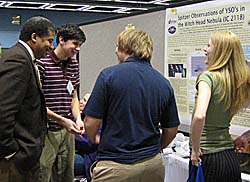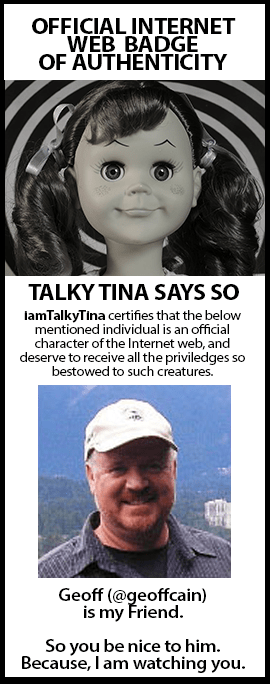| Tim Spuck’s students discuss their search for T Tauri stars with renowned astrophysicist Neil deGrasse Tyson at the American Astronomical Society conference in January 2007. (Photo credit: Wikipedia) |
In a recent episode of Cosmos: a Spacetime Odyssey, Neil deGrasse Tyson spoke of the dissemination of scientific ideas and publishing as part of the scientific method: “Science requires openness to flourish: our understanding of nature belongs to the world.” Ironically, in the same week, I visited our university library to discuss how the College of eLearning and Extended Ed could support their work and one of the librarians told me that they had to drop the journal Nature because it is too expensive. For our little institution it would be over 10k a year for the basic journal – forget about specialty journals. The old model of publishing hampers scientific progress! It certainly limits the examination and testing of ideas to only the colleges that can afford those particular journals. What happens to us if the genius that will cure cancer can only afford a state college? Or is in another country? How much do we lose when the responses, counter-arguments, and reproduction of experiments can only come from a particularly privileged perspective? We all benefit from diverse points for view, including the original investigators. Yes, I would like it if some alumni were able to pool their resources and get us a subscription to Nature and its associated journals. But I would like it even more if more journals followed a Creative Commons model and opened research up to everyone. I loved what the Creative Commons website has to say about this:
The more we understand about science and its complexities, the more important it is for scientific data to be shared openly. It’s not useful to have ten different labs doing the same research and not sharing their results; likewise, we’re much more likely to be able to pinpoint diseases if we have genomic data from a large pool of individuals. Since 2004, we’ve been focusing our efforts to expand the use of Creative Commons licenses to scientific and technical research. (Emphasis my own.)
There are new models of scientific publishing that include openness. Even Nature is taking advantage of open licenses in a limited way.
Another exciting development is the Directory of Open Access Journals which searches 5,622 journals at the full-text article level.
Everyone benefits from open access to data and information. Lets serve the research, not the business models. As the Berlin Declaration on Open Access puts it open access scientific literature should be publicly available, free of charge, and on the Internet “so that those who are interested can read, download, copy, distribute, print, search, refer to and, in any other conceivable legal way, use full texts without encountering any financial, legal or technical barriers other than those associated with Internet access itself.”






